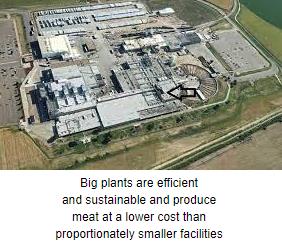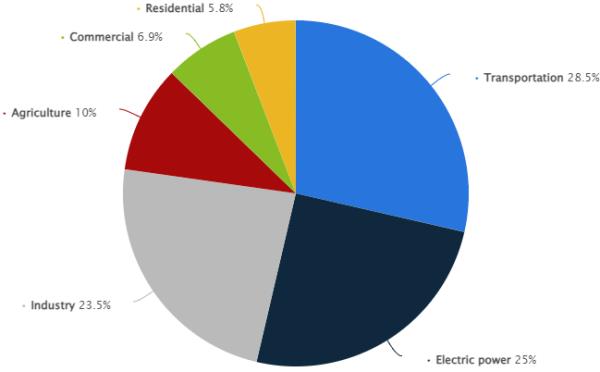The recent COP 28 Environmental Conference held in the United Arab Emirates generated a declaration on sustainable agriculture, resilient food systems and climate action signed by 150 nations. The declaration included, “Maximize the climate and environmental benefits while containing and reducing harmful impacts associated with agriculture and food systems---and shifting from higher greenhouse gas-emitting practices to more sustainable production and consumption approaches. The Food Agriculture and Water Day, a component of COP 28 specifically addressed, “high consumption of food products with high GHG footprints in some locations contributing unnecessarily to the emissions by agrifood systems.”
 The conclusion of the COP 28 Conference was encapsulated in a letter signed by 250 environmental groups and scientists urging the U.S. Department of Agriculture to “immediately make meat and dairy reduction a key part of climate strategy.” Under the current administration we have a paradoxical situation with the Department of Agriculture openly assuming some of the responsibilities of the Environmental Protection Agency and establishing policies that are contrary to the best interests of agriculture. Hopefully reason will prevail under a subsequent Administration under a Secretary with a balanced perspective.
The conclusion of the COP 28 Conference was encapsulated in a letter signed by 250 environmental groups and scientists urging the U.S. Department of Agriculture to “immediately make meat and dairy reduction a key part of climate strategy.” Under the current administration we have a paradoxical situation with the Department of Agriculture openly assuming some of the responsibilities of the Environmental Protection Agency and establishing policies that are contrary to the best interests of agriculture. Hopefully reason will prevail under a subsequent Administration under a Secretary with a balanced perspective.
In previous decades, opposition to intensive livestock production of both meat and dairy products was predicated on considerations of welfare. Advocates of a vegan lifestyle based their attacks on animal agriculture on philosophic grounds, relating to the morality of raising and slaughtering of herds and flocks. Opponents of meat and dairy production have now merged with the environmental movement claiming that meat consumption is a major contributor to deforestation and greenhouse gas emissions.
 Signatories to the January 11th letter to the Secretary of Agriculture note that meat and dairy products contribute materially to the one-third of global greenhouse gases generated by all food and agricultural activities. The emphasis on protein production and the demonization of meat and dairy consumption was a cynical attempt by the organizers of COP 28 to divert attention from the impact of petroleum sources of energy representing the income of the host Nation. Naturally those in favor of a vegan lifestyle cited the high level of meat consumption in the U.S. and advocated replacement with plant-based foods. Presentations and communiqués from the COP 28 Meeting equated projected savings in greenhouse gas emissions by eliminating meat consumption with the enforced obsolescence of automobiles powered by internal combustion engines.
Signatories to the January 11th letter to the Secretary of Agriculture note that meat and dairy products contribute materially to the one-third of global greenhouse gases generated by all food and agricultural activities. The emphasis on protein production and the demonization of meat and dairy consumption was a cynical attempt by the organizers of COP 28 to divert attention from the impact of petroleum sources of energy representing the income of the host Nation. Naturally those in favor of a vegan lifestyle cited the high level of meat consumption in the U.S. and advocated replacement with plant-based foods. Presentations and communiqués from the COP 28 Meeting equated projected savings in greenhouse gas emissions by eliminating meat consumption with the enforced obsolescence of automobiles powered by internal combustion engines.
The signatories to the letter call on the USDA to make dairy and meat reduction a significant component of USDA climate strategy. Specifically, the signatories requested USDA to increase “healthy, plant-based foods in school meal programs.” It was also suggested that sustainability should be incorporated into the next edition of the Dietary Guidelines for Americans, emphasizing plant-based consumption.
|

|
Since 2021, the USDA has attempted to dismantle the current structure of the meat and poultry industry. This has involved an emphasis on the risks associated with centralization and consolidation and consistently demonizing the four large meat packers. Concurrently the USDA has attempted to develop regional small-scale production at great cost to taxpayers. None of these initiatives have influenced either the scale of domestic production or volume of exports. The USDA has expended billions in public funds on capricious projects, mostly directed to cooperatives, the alleged disadvantaged and minority farmers but with negligible controls and an inability to measure return on expenditure.
directed to cooperatives, the alleged disadvantaged and minority farmers but with negligible controls and an inability to measure return on expenditure.
Organizations representing intensive livestock production should take heed of the shifting approach of opponents and preempt adverse publicity through proactive social and mainstream media campaigns. These will be required to demonstrate the benefits of balanced diets, advances in sustainability and of economies of scale in production.